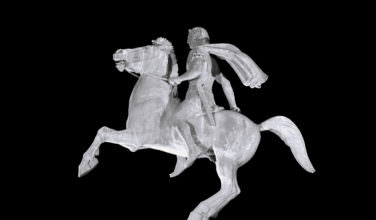Ostracism – Legal Social Shunning in Ancient Greece
Comments Off on Ostracism – Legal Social Shunning in Ancient Greece
 It is well known that democracy was invented in Ancient Greece in the city-state of Athens. However, what people don’t necessarily realize is that ostracism was also invented in Ancient Athens as a part of this new democracy. Each year, the Athenian citizens who were eligible to vote would determine who would be ostracized that year. In other words, the people would determine who would be forced into exile by popular demand. Here’s more information about the social practice of ostracism and how it developed in Ancient Greece:
It is well known that democracy was invented in Ancient Greece in the city-state of Athens. However, what people don’t necessarily realize is that ostracism was also invented in Ancient Athens as a part of this new democracy. Each year, the Athenian citizens who were eligible to vote would determine who would be ostracized that year. In other words, the people would determine who would be forced into exile by popular demand. Here’s more information about the social practice of ostracism and how it developed in Ancient Greece:
Definition of Otracism
Webster’s Dictionary defines ostracism as it pertains to Ancient Greece as, “a method of temporary banishment by popular vote without trial or special accusation practiced in ancient Greece.” This procedure was conducted in Athens roughly once a year, and any citizen of Athens could be temporary expelled for a total of ten years. At the time, the rules of citizenship were fairly strict and it worked out that only about ten or twenty per cent of the total population were able to achieve citizenship. It is said to have been introduced in the early days of democracy by Cleisthenes, one of democracy’s chief advocates and developers.
How it Was Used
The Athenian democracy was invented and implemented shortly after the people had toppled their oppressive government. Because the people had bad experiences in the past of being ruled by tyrants, they wanted to find a way to prevent that from happening. This process of legally exiling someone who was perceived as a threat to the city-state, the citizens were able to prevent a tyrant or any other unsavory citizen from harming their democratic ideals. After democracy had been in place for a while, the threat of a tyrant rising had begun to diminish. However, ostracism was still a regular occurrence because it offered a way for the citizens to decide between opposing policies or individuals they perceived as being too radical for their ideals.
Famous Citizens Who Were Ostracized
In the time of Ancient Greece, many of Athens’ famous citizens were often ostracized. For instance, Themistocles, one of the heroes of the Persian Invasions, was eventually ostracized by the Athenian citizens. In an ironic twist of fate, he spent the rest of the days living in the very empire he so enthusiastically prevented from invading Greece. He became an advisor to one of the Persian kings, and he had that role until his death. The very last individual who was ostracized was Hyperboles, an Athenian politician. He spent a considerable amount of time urging the citizens of Athens to expel his rival, but they ostracized him instead.
Some historians believe that ostracism was developed as a way to give the democratic system a means for checks and balances. It presented the people a way to legally shun someone they believed wasn’t good for their democratic system of government. Although it was used frequently in the early days of democracy, however, it seems to have been used less frequently after the Persian Wars.
Sources:
Wikipedia – Athenian democracy
Categorized in: Ancient Greek History
This post was written by Greek Boston





